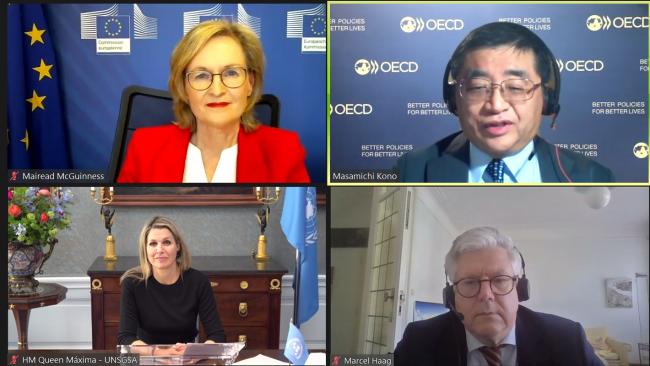UNSGSA Queen Máxima virtual remarks at the launch of the joint European Commission/OECD-INFE project to develop a financial competence framework in the European Union on 26 April 2021.

I am very happy to be here. I would like to congratulate Commissioner McGuinness and her partners at the OECD with their leadership on this important issue.
Several years ago we spoke with the previous Commission about the importance of financial literacy. It is wonderful to see that the seed that was planted then is now coming to fruition. Having an active role of the Commission is a vital step in our joint efforts to improve financial literacy and financial health in the European Union. Especially now.
The COVID pandemic has shown that those who are financially vulnerable have been hit the hardest. We are talking about those who work in low-paid jobs, with flexible contracts, and small entrepreneurs, especially those who are self-employed. In other words, there is an even more urgent need for citizens to have the ability to make the right financial choices. If we don’t act effectively, the pandemic will cause a long term increase in inequality.
There is a growing body of research that is proving there is a link between financial health, physical health and mental health.
Financial problems cause stress. This can immediately affect mental health and lead to non-rational behavior like over-borrowing as a way out of their financial problems. Being over-indebted not only affects individuals and their households but it is also associated with increased costs for society and the economy as a whole.
Our common challenge is to develop a financial and education system that promotes sensible financial behavior and – therefore – contributes to financial resilience. Because we know that financially resilient households are less affected by economic shocks. We’ve seen that in the 2008 crisis and we are seeing it again in the current pandemic.
We need to focus our efforts where they matter most. We need to ask ourselves: who are the most financially vulnerable? And how can we help them manage their finances both now and in the future?
The Commission can play an important role by collecting data and examples, bringing organizations together and sharing good practices and tools. For example: tools designed to support making the right financial decisions around important life events, such as starting your first job, getting married or buying your first home.
And seen from a holistic perspective: the importance of financial literacy is reinforced and made ‘more real’ when it is complemented with access to financial products that are suited for peoples’ needs and capabilities within a financial system that protects its customers.
Today marks the first step of a journey. I hope the Commission, with the help of the OECD and all the other experts who have been active in this field for years, will continue to show leadership in developing and implementing this competence framework for financial literacy.
It will help households become more resilient. And it will help our economies to recover and become stronger. This is in all our interests.
